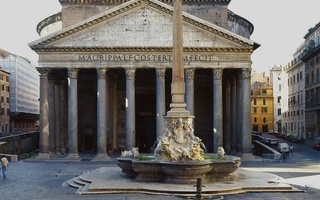So there we have it. Another fiscal cliff narrowly averted, another 11th hour deal— a Band-Aid on an open wound, and a two-week long government shutdown that cost taxpayers billions and benefited no one. Is this how democracy was really meant to function?
The public certainly doesn’t think so. The latest Gallup Poll gives Congress an approval rating of 11 percent, just one percentage point above the all-time low of 10 percent since polling began four decades ago. And with a lagging economy, soaring economic inequality and a grossly unbalanced budget, it is no surprise that the American populace is becoming disillusioned. One cause for discontent stands out far above the rest: Congressional gridlock and overall government inefficacy.
Yet this isn’t the first time a superpower struggled with the problems of partisan bickering, political deadlock and public discontent. Indeed, it happened long, long ago in the very system that our government was modeled after: the ancient Roman Republic.
We owe much of our modern democracy to our Roman predecessors, including the idea of representative government, separate legislative and executive branches, and the notion of executive veto power. Two Roman ideas in particular have transcended the ages and ingrained themselves within the American political system: the concept of checks and balances and a profound respect for law and protocol. Both are important elements of a fair and healthy government, but they can also be dangerous if abused.
That’s what happened in Rome. As the city grew increasingly prosperous and the stakes rose, the politically astute realized that the system of checks and balances could be easily exploited—all one needed was one of ten tribunes (a high-ranking legislative official), for example, to veto a bill to defeat it. Moreover, “respect for rules” became a euphemism for exploiting technicalities to get things (or prevent them from being) done. That meant that anyone politically powerful could effectively annul any legislative agenda he didn’t like. But since everyone was doing that, it meant nothing got done.
In light of Ted Cruz’s 21-hour non-filibuster filibuster before the government shutdown, it may be telling to note that it was also in Ancient Rome that the technique of filibuster was first perfected. The original master of the art of filibuster was a prominent conservative politician named Cato the Younger, who was famous for delivering speeches that lasted days to prevent issues from being voted upon. Cato has often been idolized for his principled politics and moral rectitude, but in reality his uncompromising attitude helped bring down the Republic.
There were other problems too, of course. A deepening ideological divide between the Optimates and the Populares, the two reigning political groups at the time, meant that partisanship and bickering were the norm, and cooperation a rarity. As money played a larger and larger role in elections, political alliances calcified and breaking ranks on important votes became more difficult, which further contributed to political gridlock. And as partisanship increased, routine votes and noncontroversial issues were politicized and exploited to harm political opponents—because, after all, it was always the majority faction and executive branch that were blamed for government inefficacy. When politicians start to see politics as a game, everybody loses.
Unfortunately, these problems will appear woefully familiar to the 21st century American. The current political climate is a maelstrom of filibuster, gridlock, deepening ideological differences and widespread public disillusionment that is reminiscent of Rome in the final decades of the Republic. Times change but people don’t—and that’s why the turmoil of our ancestors provides us with an invaluable lesson about our own troubled times.
Cato lived to see his beloved Republic collapse. As tensions rose and civil war loomed, the general Julius Caesar sent one final plea for compromise—one so reasonable that the Senate voted overwhelmingly in favor of it. But Cato, with his principled recalcitrance, exploited a Senatorial technicality to render the vote ineffectual, and no deal was reached. So Caesar crossed the Rubicon, and the rest is history.
We are the Romans of today. Like Rome, we face a battle—not for our safety or our livelihoods, but for the integrity of our system of governance. Rome lost that battle, because it failed to fix what was broken. But we don’t have to.
Part of the solution is adding a political price tag to obstructionist tactics that undermine the system. If politicians know that the public cares more about compromise to ensure a functional government than about Congressmen who are very good at refusing to negotiate, they may be more likely to cooperate for fear of retribution at the polls. A recent Gallup survey shows that public opinion is moving in that direction.
Another issue is tackling the system of campaign financing. Record spending during the last election cycle demonstrates the rising role of money in politics, a phenomenon that makes it more difficult for politicians financially reliant on their party to break ranks for a compromise. Indeed, a summer survey found that 42 percent of U.S. business leaders think that the campaign finance system is entirely broken.
So it’s time to reflect on our current political climate and recognize that we need to fix what’s broken. Because this isn’t the way democracy is supposed to function. In fact, it isn’t even democracy at all—it’s Cato’s Republic all over again.
Geoffrey B. Kristof ’17 is a Crimson editorial comper in Grays Hall.
Read more in Opinion
Dreidels and DrumsticksRecommended Articles
-
The Logic of ObstructionIf GOP Senate logic applies, that means Coakley won with six percentage points to spare.
-
Tyranny of the MinorityIf Obama maintains any aspirations of passing the significant portions of his agenda, what alternative does he have?
-
Changes in Congress Affect Harvard IssuesThe shake-up in Washington yesterday has made waves that will soon make their way to Cambridge.
-
 The Rotunda
The Rotunda -
 My Roman Holiday
My Roman Holiday -
Dirty HarryIn drafting a bill for the consideration of the full Senate, Reid stripped out the assault weapons ban promoted by Obama, reasoning that it had no chance of passage thanks to the filibuster.













